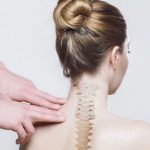What You Need to Know About Lumbar Spinal Stenosis
The lower area of the spine, commonly known as the lumbar region, consists of five vertebrae. When the spinal canal narrows in the lumbar region, it compresses the nerves that travel through the lower back and into the legs and feet. This narrowing and subsequent compression is known as lumbar spinal stenosis and can be caused by the gradual wear and tear that occurs over time, injury to the spine, bone spurs, or bulging discs. Lumbar spinal stenosis typically affects people as they get older, as it is more often a degenerative condition. The condition can cause symptoms such as:
- Trouble walking distances
- Numbness, heaviness, or weakness in the legs, calves, or buttocks
- Burning pain that radiates from the lower back into the legs
- Loss of sensation in the feet
- Cramping in the calves
In more severe cases, patients may experience loss of motor functioning of the legs, loss of normal bowel/bladder function and control, or severe pain in one or both legs. If experiencing these symptoms, seek immediate medical attention as soon as possible.
What is the Best Treatment for Lumbar Spinal Stenosis?
There are several non-surgical treatments that can help alleviate symptoms caused by lumbar spinal stenosis, including:
- Anti-inflammatory medications, including non-steroidal anti-inflammatory drugs (NSAIDs) to reduce swelling and pain
- Physical therapy to strengthen the back, stomach, core, and leg muscles, as well as build endurance and increase flexibility
- Posture management and ergonomics
- Exercises, such as walking or swimming
- Steroid or epidural injections that work to reduce swelling and inflammation
- Acupuncture or chiropractic treatment
If non-surgical treatments do not bring relief, or if the patient’s case of lumbar spinal stenosis proves to be more severe, spinal surgery may be required. Depending on the severity of the deterioration, different surgical procedures may be used, such as:
- Laminectomy
- Foraminotomy
- Medial Facetectomy
- Posterior Lumbar Interbody Fusion
- Anterior Lumbar Interbody Fusion
- Transforaminal Lumbar Interbody Fusion
- Instrumented Fusion
- Posterolateral Fusion
Contact the board-certified surgeons at New Jersey Spine Specialists today to identify the appropriate treatment plan. The NJSS doctors will conduct a comprehensive consultation before recommending a treatment approach to fit your unique solution.
Is Walking Good for Lumbar Spinal Stenosis?
Walking is a good exercise for lumbar spinal stenosis as the patient can control their comfort levels. With a good pace and distance, walking can help to alleviate the symptoms felt as a result of lumbar spinal stenosis. If walking ends up triggering symptoms, alternative exercises include water aerobics, swimming, cycling, or an elliptical machine may be more appropriate. No matter the exercise, patients should be sure to pace themselves and schedule time for rest.
Is Lumbar Spinal Stenosis Serious?
Lumbar spinal stenosis does not typically have a standard course of development or timeframe. Patient symptoms may be intermittent, with occasional flare-ups, and can even improve. However, while rare, lumbar spinal stenosis can lead to serious complications and aggravated symptoms. If the lumbar spinal stenosis compresses the spinal cord, causing symptoms such as intolerable pain, progressive weakness in the leg, urinary retention, or loss of bowel/bladder control, it is advised they see a doctor immediately.
What Happens if You Let Lumbar Spinal Stenosis Go Untreated?
Although rare, if a patient leaves lumbar spinal stenosis untreated, they may experience progressive symptoms that can cause permanent balance problems, numbness, weakness, incontinence, or even paralysis.
Lumbar Spinal Stenosis Treatment at NJSS
If you are experiencing symptoms of lumbar spinal stenosis, contact the board-certified doctors at New Jersey Spinal Specialists today by calling 908 608-9619. With excellent telemedicine capabilities, and customized treatment and patient care, NJSS can be sure to get you on the right track to managing your symptoms.
Source(s)
* Spine Health: https://www.spine-health.com/conditions/spinal-stenosis/lumbar-spinal-stenosis
* Hopkins Medicine: https://www.hopkinsmedicine.org/health/conditions-and-diseases/lumbar-spinal-stenosis








